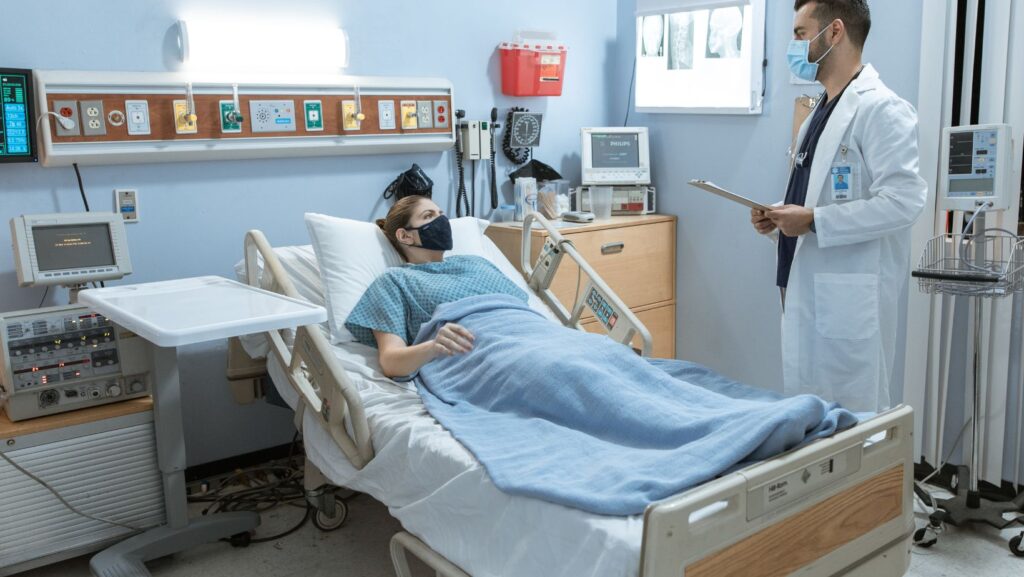
Medical errors rank as the third leading cause of death in America, taking more than 250,000 lives each year. Hospital negligence contributes to thousands of these deaths that could have been prevented.
Your safety during a hospital stay depends on your awareness. Studies prove that patients who stay alert and monitor their care have better outcomes with fewer complications.
The healthcare system can feel daunting, particularly if something goes wrong. This complete guide will help you spot warning signs, keep records of your concerns, and defend your rights as a patient.
These significant steps will protect your safety and well-being throughout your hospital care. You need to understand them before your next medical visit.
Common Warning Signs of Hospital Negligence
Patients need to stay alert and understand proper medical care standards to spot signs of hospital negligence. Warning signs like surgical mistakes and staffing problems often point to deeper issues in healthcare facilities.
Red Flags in Medical Care
Surgical errors are some of the most serious signs of hospital negligence. Medical staff leaving equipment inside patients or operating on wrong body parts shows severe protocol failures. Wrong medication dosages and incorrect prescriptions put patient safety at risk.
- Unexpected complications after procedures
- Medical conditions that worsen without proper monitoring
- Doctors missing or delaying diagnoses
- Getting infections from dirty equipment
- Wrong medications or bad reactions
Staffing and Communication Issues
The right number of staff members directly affects patient care quality. Hospitals need to keep proper staff-to-patient ratios and give their medical personnel complete training. Poor communication between healthcare providers often leads to complications and injuries that could have been prevented.
Facility Maintenance Concerns
Patient safety depends on clean and well-maintained medical facilities. Poor infection control often leads to patients getting sick while in the hospital. Broken equipment, unclean conditions, and faulty safety systems are serious violations of care standards.
Patients should document any warning signs they notice. These records become vital if they need to take legal action. The success of medical negligence cases often depends on detailed documentation of these warning signs and how they affect patient care.
How to Document Potential Hospital Negligence
Good documentation is your best defense against hospital negligence. Your original records help establish clear patterns of care problems or medical oversights.
Creating a Medical Timeline
A well-documented chronological record strengthens potential hospital negligence claims. You should record all medical procedures, medications, and interactions with healthcare providers. Write down specific dates, times, and names of medical staff involved in your care. Keep detailed entries about symptoms, treatments, and concerning incidents during your hospital stay.
Gathering Evidence and Records
Strong evidence supports your hospital negligence case. Ask for copies of:
- Medical charts and test results
- Medication administration records
- Communication between healthcare providers
- Billing statements and insurance documents
- Hospital policies regarding your treatment
Taking Photos and Notes
Visual proof backs up written records in hospital negligence cases. Take photos of visible symptoms, injuries, or unsanitary conditions. Document your conversations with medical staff and their responses to your concerns. List any witnesses present when incidents occur.
Get copies of all medical records before leaving the hospital. Keep tracking your follow-up care and any ongoing complications after discharge. Put all evidence in date order and create backup copies to keep them safe. A daily journal about your recovery process and challenges can be helpful.

Note that you should document any money-related effects, like extra medical costs or lost wages. Stay objective when you gather evidence. Focus on facts rather than emotional responses. This approach makes your documentation more credible if you need to take legal action.
Steps to Report Hospital Negligence
You need to follow specific procedures when filing a hospital negligence complaint. The right reporting channels will protect your rights and interests as your case moves forward.
Internal Reporting Procedures
Start by filing a formal complaint with the hospital’s patient advocacy office or quality assurance department. We submitted a written complaint that details your concerns and experiences. The hospital should respond to your grievance quickly. Make sure to keep copies of all correspondence and follow up if you don’t get a timely response.
Regulatory Agency Complaints
You have the option to file complaints with regulatory bodies that oversee healthcare facilities. The Consumer Protection Act lets you seek redressal through State and National Commissions. These commissions handle cases based on the compensation amount you seek:
- State Commissions manage claims up to specified limits
- National Commission addresses larger compensation claims
- You can approach multiple forums at the same time
When to Contact Hospital Negligence Lawyers
You’ll need legal representation in several situations. A hospital negligence attorney should review your case if:
The hospital dismisses your complaints without proper investigation. Medical records show clear evidence of negligence. You’ve faced serious harm or financial losses. The facility won’t acknowledge documented errors
All the same, timing is vital in hospital negligence cases. Like other legal matters, these cases have specific filing deadlines. A qualified attorney can guide you through complex medical negligence laws and ensure you submit proper documentation.

The National Commission states that hospitals are responsible for their staff’s actions, including those of contracted professionals. Your case can move forward through different channels at once – to cite an instance, you can pursue both a Consumer Protection Act complaint and other legal remedies.
Note that compensation claims need clear evidence of negligence. Cases succeed when they show a direct link between the hospital’s actions and resulting harm. Your attorney can review your case’s strengths and suggest the best course of action.
Protecting Your Legal Rights
Legal protection in hospital negligence cases starts when you understand your basic rights as a patient. A civil contract binds patients and healthcare providers through informed consent and professional duties.
Understanding Patient Rights
The Consumer Protection Act gives patients several key protections:
- Right to receive competent medical care
- Access to complete medical records
- Informed consent for procedures
- Protection against negligent practices
- Right to seek compensation for damages
These rights apply whatever the treatment cost – free or paid. The National Commission has made it clear that hospitals must answer for their staff’s actions, including contracted professionals.
Preserving Evidence
Your legal position becomes stronger with complete documentation. Medical records are the foundation of negligence claims. The law accepts different types of evidence:
- Medical charts and diagnostic reports
- Treatment timelines and medication records
- Witness statements from medical staff
- Expert opinions on standard of care
- Financial records of additional expenses
Courts need clear evidence that connects negligent actions to the harm caused. Your documentation should stick to facts rather than emotional responses.
Working with Hospital Negligence Attorneys
Your case outcome often depends on choosing the right legal team. Attorneys review cases based on several factors:
The extent of negligence and resulting harm Strength of available evidence Applicable compensation guidelines Statute of limitations considerations
Cases succeed when they show clear violations of medical standards. The National Commission’s precedents help determine compensation based on the damage type and extent.
Some cases can move through different legal channels at once. You could pursue both consumer protection claims and other legal options under the law. Your attorney will help you navigate these complex processes and ensure proper documentation and timely claim filing.
Understanding Legal Avenues in Medical Negligence and Product Liability
While medical negligence claims typically arise from errors in care or failure to meet professional standards, some injuries stem from defective medical products. For instance, lawsuits related to Depo Provera illustrate how product liability cases differ from medical malpractice claims.
Doctors are generally not held responsible for injuries caused by side effects that manufacturers failed to disclose. Instead, these cases target the manufacturers in product liability claims. As in multidistrict litigation (MDL) cases, such as ongoing Depo Provera lawsuits, plaintiffs can consolidate discovery while retaining individual cases. This approach highlights the importance of distinguishing between medical negligence and product liability when seeking compensation for harm.
Conclusion
Medical negligence in hospitals poses a real threat to patient safety. Your watchfulness and awareness are crucial when seeking medical care. You need strong defenses against medical negligence through warning signs, detailed documentation, and proper reporting procedures.
Patients should take an active role in their healthcare experience. They must track their care quality and document any concerns. You should also know your legal rights and the right channels to report negligence. This helps ensure proper action when problems arise.
Note that prevention through awareness works better than seeking remedies after harm occurs. You can substantially reduce your risk of medical negligence. Keep detailed records, learn about hospital protocols, and voice your concerns immediately.
Your safety depends on staying informed and acting quickly when you notice potential risks. This piece has given you the tools to protect yourself and your loved ones during hospital stays.












